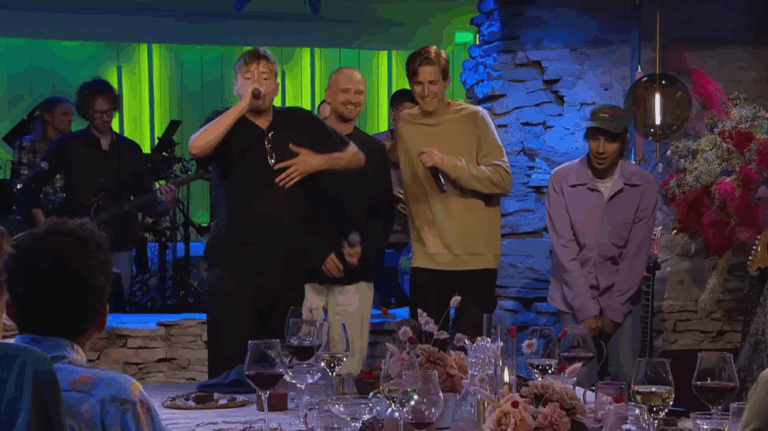Kid Eriksson, who is most known as Orup’s son, has become a very successful artist in Sweden’s vibrant hip-hop group Tjuvjakt in recent years. The group’s collaborative pulse and Lidingö roots provide a stark contrast to his father’s glitzy pop career. Kid, however, is redefining rather than rebelling. In the 1980s and 1990s, Orup filled stadiums with polished pop ballads; today, his son fills playlists with songs that are emotionally grounded, cleverly crafted, and feel very personal.
Kid has created a new genre of Swedish rap by working with innovative artists like Estraden and Newkid, one that strikes a balance between narrative depth and accessibility. He adds a subtle kind of structure to the group’s layered production, making his presence especially inventive. His signature style is evident in songs like “Tårarna i halsen” and “Apelsinskal”—sensitive yet daring in rhythm, akin to a poet riding a rolling bassline while tapping into heartbreak.
Kid’s unexpected appearance during the 2019 season of “Så mycket bättre” was incredibly moving and connected with thousands of viewers. While rapper Petter was performing a cover of Orup’s classic song “Stockholm,” Kid and Tjuvjakt came out backstage to join in. His father was particularly moved by the incident and described it as one of the most touching and surreal surprises of his career. The sincerity of the performance—rather than its spectacle—made it a cultural moment.
Profile Overview – Kid Eriksson (Orup’s Son)
| Attribute | Details |
|---|---|
| Full Name | Kid Eriksson |
| Year of Birth | 1991 |
| Parents | Hans Thomas “Orup” Eriksson and Sofia Eklöf |
| Occupation | Musician, Producer |
| Known For | Member of Swedish rap group Tjuvjakt |
| Group Members | Fredrik “Woodz” Eriksson, Olle Grafström, Jesper Swärd, Arvid Lundquist, Kid Eriksson |
| Notable Tracks | “Tårarna i halsen”, “Apelsinskal”, “Tusen spänn” |
| Musical Style | Hip hop, pop-rap, Swedish rap |
| Public Moment | Surprise appearance on TV4’s “Så mycket bättre” |
| Associated Acts | Petter, Estraden, Newkid |
| Reference | Wikipedia – Tjuvjakt |

The Swedish music scene has become more varied over the last ten years, with rap and hip-hop becoming more popular. Kid’s production influence and lyrical decisions have molded Tjuvjakt, which has been incredibly effective in relating to this changing environment. The group draws on human experience—regret, nostalgia, youthful confusion, and transient happiness—instead of brash energy or overt commercial hooks. Their sound is very adaptable, combining pop-influenced rhythm and acoustic textures with poignant storytelling.
In Sweden’s contemporary music scene, where charts and algorithms frequently dictate visibility, Tjuvjakt’s genuineness is a surprisingly welcome change. The group has significantly increased its visibility without ever sacrificing its message thanks to strategic consistency and a willingness to try new things. Kid’s quiet leadership and emotional literacy in the studio are key components of that success.
For Kid, establishing a personal identity away from his father’s spotlight has presented both opportunities and challenges. Growing up surrounded by music and TV lights, he had an early understanding of the sensation of fame, but not necessarily its meaning. Since then, he has reevaluated his artistic objectives, emphasizing impact over popularity. “I’m 32 now, and I’ve moved beyond the rebellion stage,” he stated in a recent interview. All I’m trying to do is be truthful in my creations. That degree of clarity is extremely uncommon, particularly in a field that relies heavily on reinvention.
In recent years, Tjuvjakt has added songs like “Tusen spänn,” “John Daly,” and “Vaskar mina tårar” to their discography. These songs showcase a band at the height of their creative abilities, willing to take chances without sacrificing their essential identity. Kid’s ability to blend emotion and structure is still evident in their most recent releases; they strike a balance between quiet passages and lyrical precision, much like a filmmaker composing the ideal shot.
Kid has accomplished something that very few children of celebrities ever do: he has earned his position without having to erase his past by utilizing his background while navigating his own path. Through music, the bond between a father and son is especially poignant. Pop songwriting virtuoso Orup gave Kid the tools, but Kid honed them into a voice that is distinctly his own and feels incredibly clear.
Tjuvjakt has progressively broadened its audience through strategic alliances and persistent audience interaction, reaching audiences of all ages and musical tastes. Their reach is based on resonance—a gradual ascent based on shared emotion and storytelling—rather than scandal or virality.
Kid Eriksson is a great illustration of what deliberate evolution can look like for up-and-coming Swedish artists hoping to establish careers based on purpose. He shows that art can flourish without clamoring for attention if it is motivated by truth and introspection. His story demonstrates that underground credibility and pop stardom don’t have to be mutually exclusive; they can, astonishingly, be passed down and reimagined.
As Tjuvjakt progresses toward bigger stages and possibly more international projects in the upcoming years, Kid’s role is anticipated to become even more expansive. Artists like Kid, who strike a balance between introspection and innovation, will probably be in greater demand as audiences grow more adept at navigating emotional nuances.


